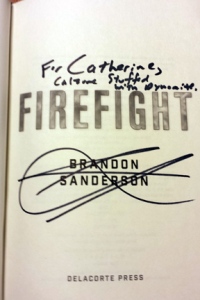
KT Bradford, aka Tempest
K.T. Bradford, also known as Tempest, recently issued a controversial* challenge to speculative fiction readers. The headline of her piece, appearing in xojane, is: “I Challenge You to Stop Reading White, Straight, Cis Male Authors for One Year”
Hmm. Intriguing. There’s a lot more to the piece than its title and I can’t do it justice by writing “about” it. It’s not long; I’d go read it if I were you. The rest of this post will be waiting when you get back.
Predictably, there was foofaraw, mostly from a certain small, vocal segment of White, Straight, Cis** Male people whom I suspect reacted as much to the title as anything else. Like many other folks, I was curious about what one particular writer who fits that demographic thought about the piece and the surrounding foofaraw. I figured I had a pretty good idea what John Scalzi would say, and that it wouldn’t be a lot different than the way I thought. I was mostly right.
Where Scalzi and I agree:
- It’s only a year
- It doesn’t have to start and end on any particular date.
- In the grand scheme of publishing, it’s extremely unlikely that a large enough group of people will be avoiding white straight cis male authors to ruin anyone’s career. If I don’t read a book by John Scalzi (or some relatively unknown white straight cis male) within a particular span, nothing says I can’t read it once the year is up. There are unlikely to be a ton of people doing it the exact same time as I, so White Guy will still sell pretty close to the same number of books within a given year as he would have otherwise.
Where Scalzi and I differ:
He’s satisfied that what he reads is varied enough. He doesn’t feel the need to accept the challenge because he already reads, enjoys, and learns from many diverse writers. Besides, if he stopped reading white, male, straight, cis writers, he wouldn’t be able to read his own work, and since he makes his living as a writer, he’d be up a creek.
On the other hand, I think my reading list could use some shaking up. Plus, I don’t have the same problem he has. I could choose to take Tempest’s challenge and still be able to read/revise/proof my own work.
My plan:
This challenge isn’t a boycott. It’s a way of opening one’s eyes to other viewpoints that have not, historically, gotten much exposure. There are so books by different kinds of writers out there. The time I spend reading something from the dominant viewpoint is time I can’t be spending expanding my horizons in a way I find especially intriguing.
So I think I’ll give it a try, once I’ve finished reading this year’s Nebula-nominated works by regular white dudes. Because I’m probably going to the Nebula weekend this year…it’s finally in Chicago!
Tempest provides a few handy lists of interesting writers, providing 1- books by women, 2- books by writers of color, and 3- books in translation. I can’t wait to see what I’ve missed.





